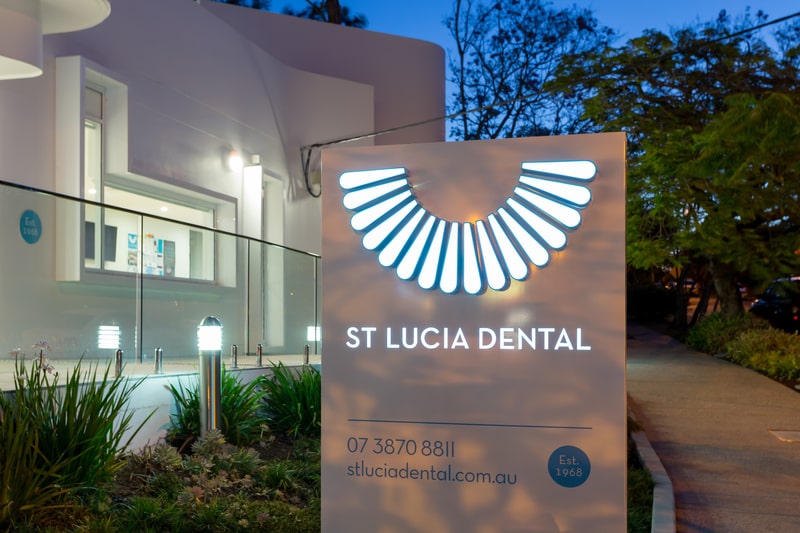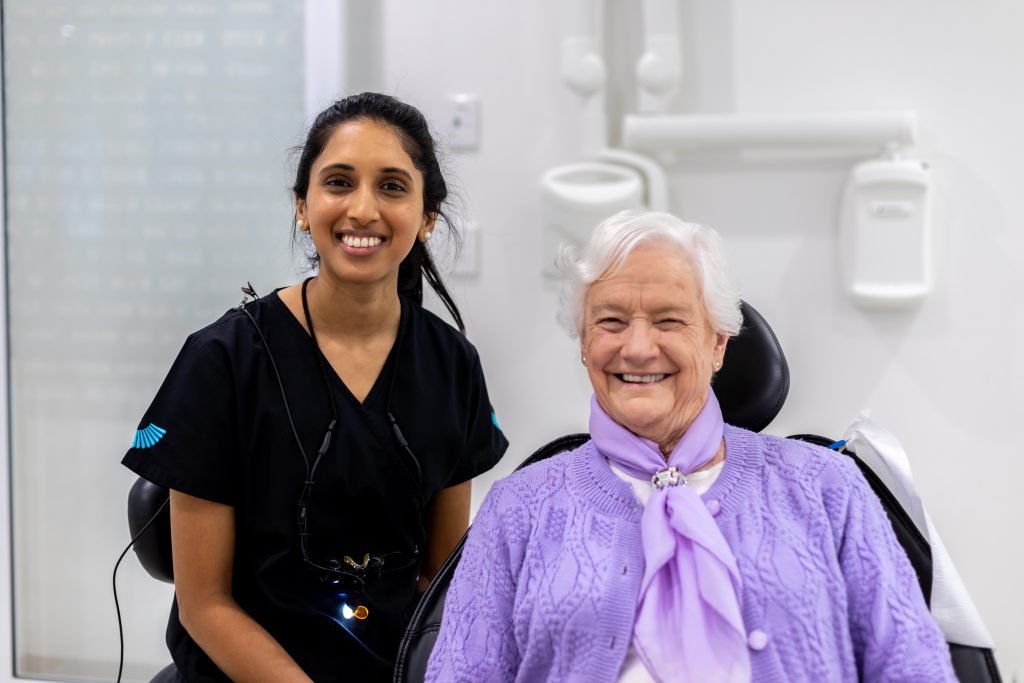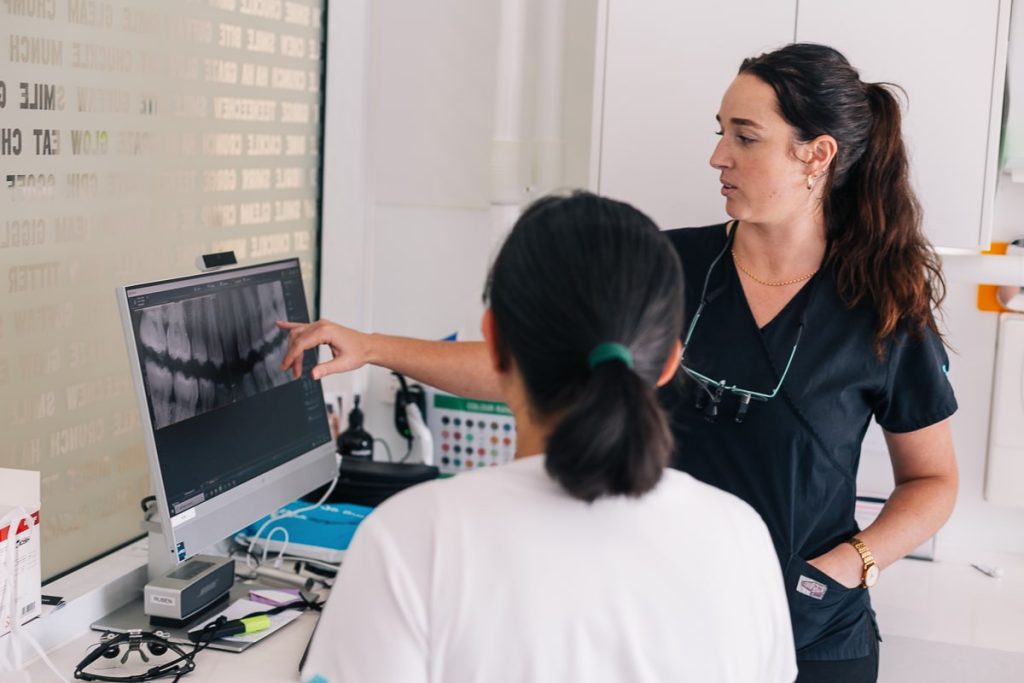
We accept all major health funds
and are a preferred provider for
We accept all major health funds and are a preferred provider for

Missing a few teeth? Gaps in your smile don’t just make eating and speaking more difficult, they can really hurt your self-esteem.
At St Lucia Dental, our experienced implant dentist can provide a permanent teeth replacement solution using advanced titanium implant technology.
With our advanced dental implants, you can replace your missing teeth with an artificial tooth that looks and feels just like the real thing, boosting both comfort and confidence.
Crafted from the highest quality materials, our implants are durable, natural-looking, and long-lasting.
With 56 years’ experience, top Brisbane dentists, and over 650 five-star reviews, your dental treatment is in expert hands.
Ready for a new smile? Enquire today to find out more!
Curious about the results you can achieve? Check out our before-and-after photos to see the transformative power of affordable dental implants and single tooth implants as part of a complete dental restoration.
At St Lucia Dental, every implant placement is tailored to your needs, using titanium dental implant systems for lasting results.
Enhance your look with a natural tooth replacement option that blends with surrounding teeth.
Eat all your favourites with ease, supported by stable implants that protect adjacent teeth.
Cut future costs with durable implants included in our full range of dental services.
Prevent jawbone loss and ageing effects with the support of a strong implant structure.

Dental implants are a permanent solution for missing teeth, offering strong support and functioning like natural teeth replacements, a service often paired with general dentistry.
Not only do they look and feel natural, but they also help preserve jawbone structure and prevent bone loss caused by missing teeth or tooth extraction.
Dental implants are a durable, comfortable option for addressing issues like missing, broken, or loose teeth, dental problems, and even advanced cases of gum disease.
In addition to restoring your smile, they improve essential functions like eating and chewing, boosting your confidence, and supporting remaining teeth.
For those missing several teeth, our implant-supported dentures provide a secure, stable alternative to traditional dentures or dental veneers.
If you’re seeking the best dental implants in Brisbane, we can help.
A Dental implant treatment at St Lucia Dental replaces a missing tooth’s root, securely supporting a replacement tooth or bridge, and preserving jawbone heal. This restores its function and appearance.

We begin with a free consult where our implant dentist assesses your needs, reviews X-rays, and designs a personalised plan.

If necessary, we perform tooth extraction and bone grafting to ensure a strong base for the implant post.

With a solid foundation ready, a titanium implant is precisely placed into the jawbone to act as your new root.

We allow a few months for the bone to fuse with the implant and provide stability for the replacement tooth.

After healing, a custom crown is attached to the implant for a natural look and lasting dental restoration.

Just keep up with routine checkups, our dental services will help maintain your smile for years to come.
How much are Dental Implants Brisbane? The cost of affordable dental implants varies depending on your individual needs and the treatment required.
We offer a free, no-obligation implant consultation to provide you with a customised quote tailored to your situation.
Some health funds may cover a portion of the procedure, and we also offer flexible payment plans to help manage your budget.
Implant placement is a precise procedure, our dentists are highly experienced and will guide you safely every step of the way.
We use premium materials and titanium implant systems that are strong, biocompatible, and blend beautifully with your natural smile.
As trusted local providers, we offer quality dental services at fair and transparent prices, with friendly support from all major health funds.
Enter your details and our friendly staff will give you a call!
Prefer to call? Give us a ring on
Dental implants fall under cosmetic dentistry and are essentially fake teeth. Your dentist will secure a replacement tooth root (or several) made of titanium into the bone of the jaw or skull.
This helps to support a dental crown, bridge, denture, facial prosthesis or to act as an orthodontic anchor.
Their main purpose is to bond with the jaw and provide a secure, long-term solution for missing teeth which restores your chewing ability, improves your facial appearance and prevents bone loss.
Dental implants work by a process called Osseointegration.
This is where your healthy bone bonds with a dental implant to ensure a strong and long term-connection.
This creates the perfect foundation for tooth replacement, dentures or another prosthesis.
If you have private health insurance that covers ‘Major Dental’ then you may be eligible to receive the annual limit for dental implant treatment.
This is generally in the range of $750 to $2,000 depending on the procedure performed and your level of cover.
Yes. St Lucia Dental guarantees dental implants from our practice for a period of five-years with the exceptions and conditions listed below:
The life expectancy of dental implants and dental crowns is largely dependent on patient oral hygiene, routine hygiene and dental check-up appointments, and damage from grinding. In non-smokers, dental implants have approximately a 90% survival rate of 20 years.
St Lucia Dental guarantees implants for non-smokers for a five year period from insertion date. The five-year warranty is valid only if six monthly check-up and hygiene visits are attended and night splints are worn (where recommended).
As smokers are at increased risk of Dental Implant Disease, which can lead to a dental implant failing due to bone loss and gum disease surrounding the implant. No guarantee is given to smokers.
If in doubt or for more information about dental implants Brisbane, call us to get your no obligation free consultation.
In most cases, dental implants have the highest rate of success and the longest lifespan amongst various options.
The technology has also improved dramatically in the last few years and our dental clinic can place implants within a millimetre of accuracy by using 3D ConeBeam imaging.
If you have a missing tooth (or several missing teeth), dental implants are the most natural-looking alternative.
Dental implants are used for a variety of reasons, including:
If you’re having issues, it’s best to get them sooner rather than later.
Without implants, a missing or removed tooth will cause the surrounding bone to shrink away as the bone is no longer required.
If multiple teeth are lost or removed, more bone is also lost. This affects facial muscles which can cause impaired speech, premature ageing and other serious complications.
A single tooth implant is a fixed, free-standing restoration. It consists of a crown attached to an implant embedded in the bone where there has been tooth loss.
If multiple teeth are lost they can be replaced with either an implant supported crown or implant supported bridgework.
At St Lucia Dental, our single dental implant and full arch options offer a complete tooth replacement solution. While suitable for most cases, contact us for a free consultation to ensure it’s the right fit for you.
A dental implant treatment at St Lucia Dental replaces a missing tooth’s root, supporting an artificial tooth or bridge while preserving bone health and surrounding teeth.
A bridge is referred to as a fixed restoration and unlike partial dentures, it cannot be removed. A dental bridge consists of one or more replacement teeth held by crowns, which are secured to teeth on either side of the space.
A traditional ceramic bridge is made out of two crowns and a pontic (a solid prosthetic tooth)
The crowns sit on the outside of the pontic and normally attach to your existing healthy teeth. Some people do not have a healthy tooth for the bridge to attach to and therefore require a dental implant.
This procedure is commonly used towards the back of the mouth.
There are three possible implant supported denture treatment options to suit a variety of smiles.
A fixed denture is attached to your jaw with dental implants. This denture can be removed by your dentist to be cleaned and maintained.
This is similar to a fixed denture with one clear exception. Once the required number of implants is set, a bar is attached to the implants to provide support for the removable denture. Your new denture will be able to clip into place and you will be able to remove it for cleaning.
An implant stabilised denture is when a small number of implants stabilise your denture. This is similar to fixed implant supported dentures with the exception that you can take it out each night and clean it.
If you have been without teeth for an extended period of time, then it’s likely your jawbone will have receded.
This occurs because chewing and speaking put pressure on your teeth which stimulates jawbone growth. With no teeth, this pressure can’t be applied and your jawbone will begin to regress and eventually will become very thin and insufficient to support dental implants.
If your jawbone has receded, then it is likely you will require a bone graft before you receive dental implants
Implant treatment is generally quick depending on the number of teeth replaced and patients report little to no discomfort with many patients returning to work and their normal daily activities the next day.
Mild pain relief medication is all that is needed to ease any pain or discomfort. Dental implant surgery usually involves the following three basic steps:
We will carefully locate the ideal location for the implant. Then, we surgically place the implant into the jawbone. You may have some swelling and/or tenderness after dental implant surgery, but this will subside quickly. Once in place, your implant is left to bond with your jaw bone.
This process generally takes 3-6 months and is called osseointegration. This results in an extremely strong implant and complete integration with the jawbone. Once complete, the patient can then get the permanent replacement tooth or teeth. In many cases, the implant and temporary replacement teeth can be placed in one visit.
After the healing process is complete, the implant will be checked for strength and stability. For a single tooth implant, we provide a new tooth for you, called a dental crown, which looks like and blends in with any existing tooth.
Implant-supported bridges and dentures are also custom-made to look like natural teeth and to fit your mouth.
Once the replacement tooth or teeth are fitted to your implant, treatment is complete and you can enjoy your smile!
At St Lucia Dental, we perform many dental implant procedures using advanced products from MIS Implants Technologies.
MIS is a global leader in dental implantology, offering a range of cutting-edge dental implants, superstructures, tools and kits, as well as extensive solutions for oral restoration and health.
To learn more about MIS please visit their website here.
At St Lucia Dental, if you need a dental implant procedure we also use advanced products from BioHorizon.
BioHorizon dental implants carry a lifetime warranty on the implant and are clinically proven by some of the most thorough and in-depth research in the industry.
To learn more about BioHorizon please visit their website here. We stand behind our products and will choose the best product based on your application and budget.
Hopefully, we’ve provided you with enough information to take the first step towards Brisbane dental implants at St Lucia Dental but if not we can answer all your questions in your first free consultation.
Call us or email us to arrange your no obligation free consultation. A dentist will analyse your teeth and mouth with our 3d imaging technology.
They’ll then work with you to create a plan and timetable for your treatment.
If you feel good about the plan, treatment can begin immediately. If not, you’ve gained valuable information about dental implants Brisbane and lost nothing in the process.
Mon, Wed & Thurs | 8am to 6pm
Tues | 8am to 7pm
Fri & Sat | 8am to 5pm
Sun | Closed
© 2025 St Lucia Dental. All rights reserved.